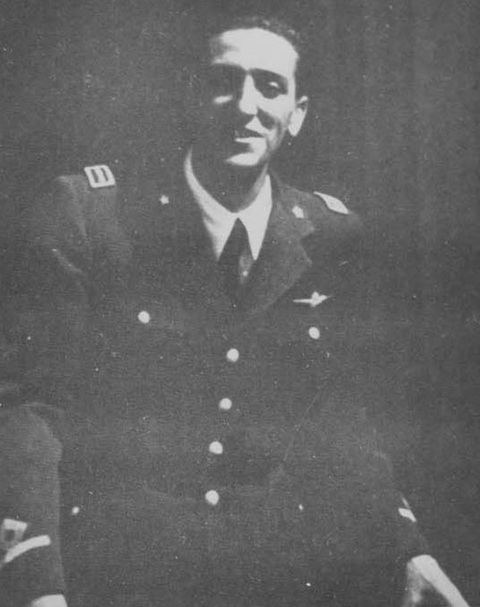Italy

Sottotenente Vittorio Barberis Medaglia d’oro al valor militare
Italy

Sottotenente Vittorio Barberis Medaglia d’oro al valor militare

10 December 1910 – 10 December 1937
| Year Gazetted | Decoration | Note |
| 1940 | Medaglia d’oro al valor militare (Posthumoust) | O.M.S. |
Vittorio Barberis was born on 10 December 1910 and was from Alessandria.
Sottotenente Vittorio Barberis took part in the Spanish Civil War using the nom de guerre ’Vittorio Fantini’.
During his time in Spain he served in the 32a Squadriglia, VI Gruppo.
During a patrol north-west of Monte Maza, on the Santander front on 16 July 1937, Capitano Ernesto Botto's patrol of five CR.32s from the 32a Squadriglia (including Sottotenente Barberis) was bounced from above by 13 I-16s. Seeing the diving enemy aircraft just in time to climb up at them, the Italian pilots duly fought a series of individual clashes that lasted for more than 20 minutes. Despite facing two or three opponents at a time, the CR.32 pilots managed to down two I-16s without losses - both kills were confirmed by Nationalist observers at Monte Maza. They were collectively credited to all five pilots, as none of them had had the time to notice that the enemy fighters had in fact been downed during the course of this exhausting combat. This was the Squadriglia’s first battle with Republican fighters.
This combat had been fought against the first I-16 Escuadrilla of the Fuerzas Aéreas del Norte.
On 10 December and in order to camouflage a planned Nationalist offensive towards Madrid on the Guadalajara, the Republican air forces were to be destroyed on their airfields east of Zaragoza. A Nationalist force of 88 bombers and 56 fighters took part in the operation. The slower bombers (SM.81s and Ju 52/3ms) were to attack the nearby airfields in the Barbastro zone; the faster bombers (SM.79s, Breguet 20s, He 111s and Do 17s) those at Sariñena, Bujaraloz, Candasnos, Puebla de Híjar, Selgua, Pomar, Lérida and Balaguer. The Condor Legion’s bombers, which had to operate from more distant bases, would require refuelling before making their return flight, and facilities were provided at Sanjurjo.
The attacks failed to achieve the desired success, however; the airfields were empty and about 70 fighters were waiting in the air. It must be said that the Republicans were very well prepared to deal with surprise air attacks. They had constructed a large number of airfields and at each was based at most a single squadron, its aircraft widely dispersed around the airfield perimeter. In addition, they had built a number of decoy airfield on with mock-up aircraft.
At least, the VI and XVI Gruppi of the Aviazione Legionaria took part in this combat and Tenente Corrado Santoro of the 31a Squadriglia (VI Gruppo) took part in an escort mission to bombers attacking Sariñena and Sottotenente Mario Visintini of the 25a Squadriglia (XVI Gruppo) took part in his first combat, firing at some enemy aircraft but without claiming anything.
At the end of the battle, the Italians claimed eight I-15s shot down for just one CR.32 lost and its pilot KIA when Sottotenente Barberis of the 32a Squadriglia, was killed in action near Alcubierre when his CR.32 collided with I-15 CC-022, flown by Soviet pilot Mikhail Vasilhevich Kotyhov from the 1a/26. The latter pilot also perished.
Group 2-G-3, which was flying below the Italians, climbed to their assistance and claimed seven I-15s without losses.
1.J/88 was airborne, with 15 Bf 109s flying deep into enemy territory. They were attacked by 30 enemy fighters. Oberleutnant Harro Harder recounted:
”Another major action on December 10. The Fiats patrolled the front, we flew deep into enemy territory with fifteen Bf 109s. Fifteen Curtisses and fifteen Ratas climbed up in close formation. There was nothing else to do, we attacked repeatedly, but so many aircraft immediately dove on us that we were happy just to escape in one piece.”The German fighters didn’t claim anything during the day.
At the time of his death, Barberis was credited with 1 biplane victory.
After his death on 10 December 1937, he was awarded a posthumous Medaglia d’oro al valor militare (gazetted 1940):
"A volunteer in a wartime mission to uphold fascist ideals, an exceptionally skilled fighter pilot, and a brave and resolute combatant, he took part in eighty-one combat missions, consistently distinguishing himself through his daring and disregard for danger. In various clashes with overwhelming enemy forces, he always charged into the fiercest part of the battle, contributing to the downing of several enemy aircraft and dispersing others. On December 10, 1937, upon sighting multiple enemy aircraft attacking an isolated comrade, he did not hesitate to intervene in his companion's defence. Overpowered by numbers and riddled with bullets, he crashed in flames after fighting with indomitable courage, sacrificing his heroic youth in devotion to his country. A shining example of camaraderie and commitment to duty."
Claims:
| Kill no. | Date | Time | Number | Type | Result | Plane type | Serial no. | Locality | Unit |
| 1937 | |||||||||
| 16/07/37 | 1/5 | I-16 (a) | Shared destroyed | Fiat CR.32 | NW Monte Maza | 32a Squadriglia | |||
| 16/07/37 | 1/5 | I-16 (a) | Shared destroyed | Fiat CR.32 | NW Monte Maza | 32a Squadriglia | |||
| 1 | 10/12/37 | 1 | I-15 (b) | Destroyed | Fiat CR.32 | near Alcubierre | 32a Squadriglia |
Biplane victories: 1 and 2 shared destroyed.
TOTAL: 1 and 2 shared destroyed.
(a) Claimed in combat with I-16s from the first I-16 Escuadrilla of the Fuerzas Aéreas del Norte.
(b) Claimed in collision with Mikhail Vasilhevich Kotyhov, who also was KIA.
Sources:
Courage Alone - Chris Dunning, 1998 Hikoki Publications, Aldershot, ISBN 1-902109-02-3
Fiat CR.32 Aces of the Spanish Civil War - Alfredo Logoluso, 2010 Osprey Publishing, Oxford, ISBN 978-1-84603-983-6
Istituto del Nastro Azzurro
Regia Aeronautica: The Italian Air Force 1923-1945 - An Operational History - Chris Dunning, 2009 Ian Allan Publishing, Hersham, Surrey, ISBN 978-1-906537-02-9


